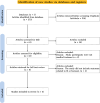The effectiveness of online educational interventions on impostor syndrome and burnout among medical trainees: a systematic review
- PMID: 39578759
- PMCID: PMC11583500
- DOI: 10.1186/s12909-024-06340-y
The effectiveness of online educational interventions on impostor syndrome and burnout among medical trainees: a systematic review
Abstract
Background: Impostor syndrome and burnout are highly prevalent among medical students and trainees, significantly impacting their mental health and professional development. The advent of online educational interventions provides a promising solution, offering accessibility and flexibility to tackle these issues. This systematic review aims to evaluate the effectiveness of online educational interventions in alleviating impostor syndrome and burnout among medical learners.
Methods: A comprehensive literature search was conducted across PubMed, Cochrane Library, Embase, Scopus and PsycInfo, identifying relevant studies published up to March 2024. Studies focusing on online interventions targeting impostor syndrome and burnout among medical students, residents, and fellows were included, and their quality was assessed using the Medical Education Research Study Quality Instrument (MERSQI).
Results: Among the screened studies, six met our inclusion criteria, comprising four randomized controlled trials, one qualitative study, and one mixed-methods study. Their mean MERSQI score was 14.67 (SD 1.23), indicating a high methodological quality. The interventions adopted in these studies varied, including group coaching sessions, workshops, and provision of educational resources. Notably, two randomized trials demonstrated significant reductions in impostor syndrome symptoms after online interventions, compared with the control groups. On the other hand, results for burnout outcomes were equivocal, with some studies reporting improved emotional exhaustion scores and decreased burnout risk, while others found no significant differences.
Conclusions: Current evidence suggests that structured online educational interventions, particularly those incorporating coaching and cognitive reframing strategies, can effectively reduce impostor syndrome among medical trainees. However, the impact on burnout remains inconclusive. Further research is needed to optimize online program components and implementation strategies to comprehensively address both impostor syndrome and burnout in this population.
Clinical trial number: As this is a systematic review rather than a clinical trial, no clinical trial number is applicable. Nonetheless, this systematic review has been prospectively registered with PROSPERO (registration number: CRD42024541034), in line with best practice recommendations for systematic reviews.
Keywords: Burnout; Impostor syndrome; Medical education; Online interventions; Systematic review.
© 2024. The Author(s).
Conflict of interest statement
Declarations. Ethics approval and consent to participate: Not applicable. Consent for publication: Not applicable. Competing interests: The authors declare no competing interests.
Figures
References
Publication types
MeSH terms
Supplementary concepts
Grants and funding
LinkOut - more resources
Full Text Sources
Research Materials
Miscellaneous


